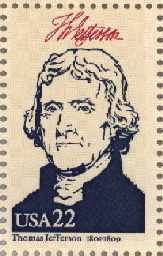
To James Madison Paris, September 20, 1785DEAR SIR, -- By Mr. Fitzhugh, you will receive my letter of the first instant. He is still here, and gives me an opportunity of again addressing you much sooner than I should have done, but for the discovery of a great piece of inattention. In that letter I send you a detail of the cost of your books, and desire you to keep the amount in your hands, as if I had forgot that a part of it was in fact your own, as being a balance of what I had remained in your debt. I really did not attend to it in the moment of writing, and when it occurred to me, I revised my memorandum book from the time of our being in Philadelphia together, and stated our account from the beginning, lest I should forget or mistake any part of it. I enclose you this statement. You will always be so good as to let me know, from time to time, your advances for me. Correct with freedom all my proceedings for you, as, in what I do, I have no other desire than that of doing exactly what will be most pleasing to you. I received this summer a letter from Messrs. Buchanan and Hay, as Directors of the public buildings, desiring I would have drawn for them, plans of sundry buildings, and, in the first place, of a capitol. They fixed, for their receiving this plan, a day which was within about six weeks of that on which their letter came to my hand. I engaged an architect of capital abilities in this business. Much time was requsite, after the external form was agreed on, to make the internal distribution convenient for the three branches of government. This time was much lengthened by my avocations to other objects, which I had no right to neglect. The plan however was settled. The gentlemen had sent me one which they had thought of. The one agreed on here, is more convenient, more beautiful, gives more room, and will not cost more than two thirds of what that would. We took for our model what is called the Maison quarree of Nismes, one of the most beautiful, if not the most beautiful and precious morsel of architecture left us by antiquity. It was built by Caius and Lucius Caesar, and repaired by Louis XIV., and has the suffrage of all the judges of architecture, who have seen it, as yielding to no one of the beautiful monuments of Greece, Rome, Palmyra, and Balbec, which late travellers have communicated to us. It is very simple, but it is noble beyond expression, and would have done honor to our country, as presenting to travellers a specimen of taste in our infancy, promising much for our maturer age. I have been much mortified with information, which I received two days ago from Virginia, that the first brick of the capitol would be laid within a few days. But surely, the delay of this piece of a summer would have been repaired by the savings in the plan preparing here, were we to value its other superiorities as nothing. But how is a taste in this beautiful art to be formed in our countrymen, unless we avail ourselves of every occasion when public buildings are to be erected, of presenting to them models for their study and imitation? Pray try if you can effect the stopping of this work. I have written also to E. R. on the subject. The loss will be only of the laying the bricks already laid, or a part of them. The bricks themselves will do again for the interior walls, and one side wall and one end wall may remain, as they will answer equally well for our plan. This loss is not to be weighed against the saving of money which will arise, against the comfort of laying out the public money for something honorable, the satisfaction of seeing an object and proof of national good taste, and the regret and mortification of erecting a monument of our barbarism, which will be loaded with execrations as long as it shall endure. The plans are in good forwardness, and I hope will be ready within three or four weeks. They could not be stopped now, but on paying their whole price, which will be considerable. If the undertakers are afraid to undo what they have done, encourage them to it by a recommendation from the Assembly. You see I am an enthusiast on the subject of the arts. But it is an enthusiasm of which I am not ashamed, as its object is to improve the taste of my countrymen, to increase their reputation, to reconcile to them the respect of the world, and procure them its praise. I shall send off your books, in two trunks, to Havre, within two or three days, to the care of Mr. Limozin, American agent there. I will advise you, as soon as I know by what vessel he forwards them. Adieu.
Your's affectionately, |
